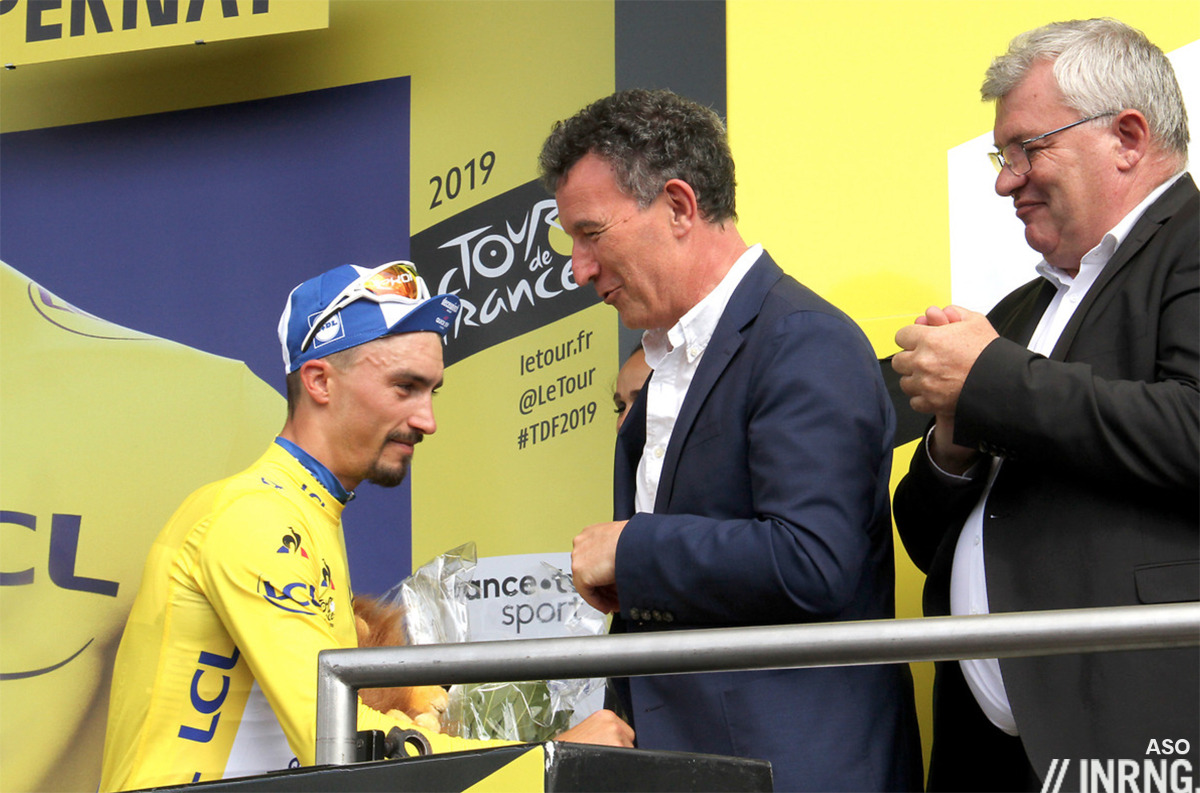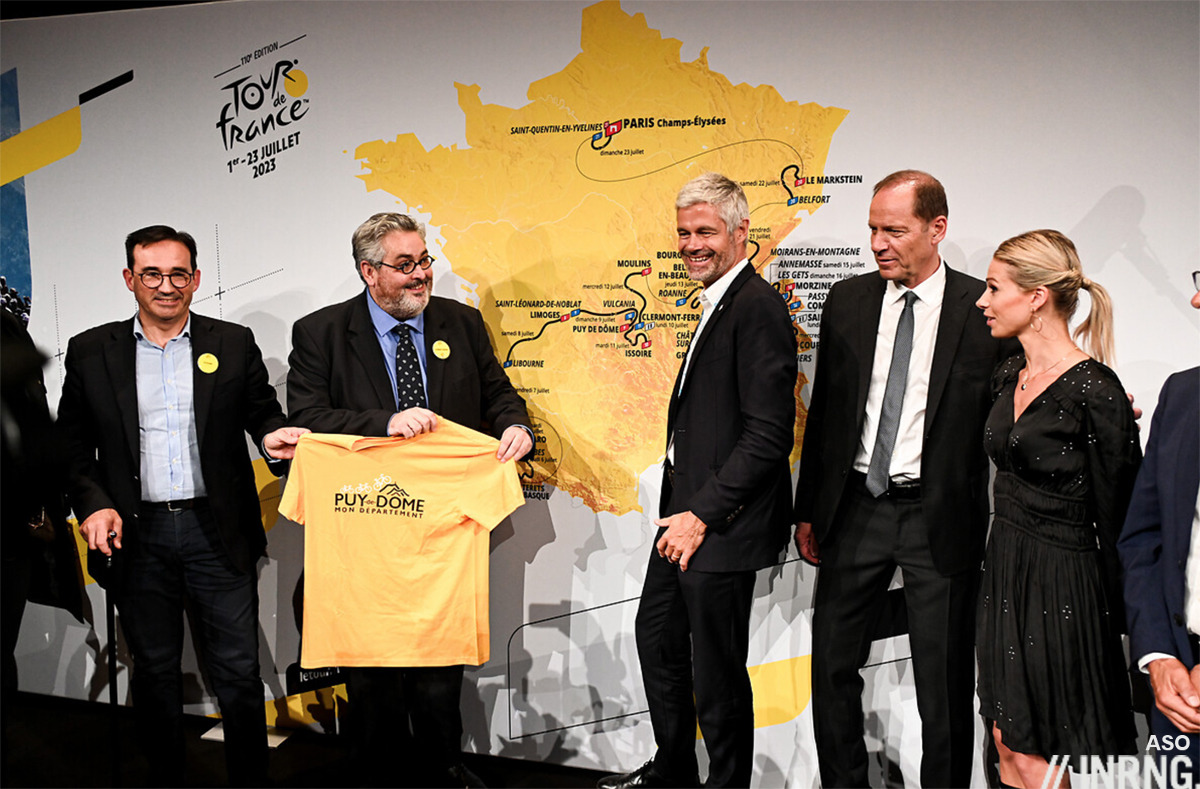If the Tour de France is a business, who are its clients? Certainly TV audiences and roadside spectators alike. But there’s third group: mayors and local government officials.
While President Macron’s visit yesterday matters – name another race where the head of state visits every year – mayors and their colleagues in local government are the hidden VIPs of the Tour de France, they make route happen, they help pay for the race and they’re changing the shape of the sport more than you might think.
The Tour goes to Bordeaux today, a city that’s been on the race route more often than Pau, and is second only to Paris for Tour visits. Only the race hasn’t been here since 2010. The fact that it’s back is a tale of sports and politics.
Race director Christian Prudhomme likes to say he can have close to 300 candidates willing to host the Tour de France so he can take his pick but it doesn’t mean he can go everywhere, after all there are over 36,000 communes in France. Now more than half of these are just villages, many are one horse towns but each has an elected mayor and all are eligible. See Sarran which hosted a stage finish for its population of 274 in 2020, albeit with regional backing, tiers of local government together.
Bordeaux is France’s 9th city by population and hasn’t been a candidate for some time but in 2021 nearby Libourne hosted the race and it’s going back tomorrow too. This started a conversation with Bordeaux’s mayor Pierre Hurmic who is a cycling fan, and according to this morning’s Le Monde Humic leapt over the barriers in Libourne to corner Prudhomme about bringing the race back to his city. But as a member of France’s Europe Ecology political party, many of his colleagues are keen on cycling, but not the Tour de France.
Many Greens see the Tour de France in a bad light: the carbon emissions, the “macho” culture, even privatising the public realm for a day to benefit a corporate event with its publicity caravan and sponsorship fest. There’s a lot the Greens don’t like, and they like to point it out. Prudhomme was able to reassure Humic and his colleagues that the Tour is trying to improve and it’s an example of the race listening to its customers. Even if the phrase doesn’t resonate everywhere in France, here the customer is always right.
To watch the Tour de France on French TV is to see ad breaks with ASO-branded videos encouraging cycling as transport, a sop to the Greens, and just a good idea too. The Tour is trying to become more ecological with more electric vehicles and even if that’s a whole other debate, it’s notable that electricity company Enedis is on board as a race sponsor to reach local councillors to talk infrastructure like charging points. When Lyon’s mayor Grégory Doucet branded the Tour “machiste“, macho, well there’s now the Tour de France Femmes where Mayor Doucet can bid to host the race if he doesn’t like the men’s event. It’s this kind of pressure, more than social media or corporate sponsors, that led to the podium hosts changing with men and women alike these days.
None of this means the Tour has become a virtuous paragon of ecology and equality of course but there’s a conversation and the race is beginning to dance to the tune of its clients: the mayors, and in turn the population. If your thesis is a grand tour is a reflection of society, here it’s mediated via the channel of local government. Curiously for France’s national sporting event, the race has yet to visit a town run by the far right Rassemblement National (ex-Front Nationale). It could be geography given many are in one spot along the Mediterranean coast like Cogolin and Fréjus… but who knows?
Customers still pay and hosting fees still count. In recent years the standard tariff has been €70,000 for a stage start and €120,000 for a finish. It’s handy income but round up and multiply by 19 days and it’s close to four million Euros, useful but remember a grand départ can “sell” for five million Euros or more. Hosting fees in total are about 10% of the Tour’s income, nice but not game changing and as we can see the start is the real earner.
But for the Tour and its director, time spent with mayors must account for a much larger share than the 10% monetary value, it’s vital for the race to have the course it wants and on the roads it needs. As well as appearances at ASO’s races and the Tour de France route presentation, Christian Prudhomme told this summer’s Pédale magazine he has two other big appointments in his diary: one is the Salon de l’Agriculture, France’s farming trade fair that’s part trade fair, part folklore and part government networking where he can meet and greet politicians (as well as the farming union whose members produce the themed field art – this year’s message is “my nature, my future”, an appeal to a new generation to take up farming). The other is the Congrès des Maires, an annual meeting of mayors where you imagine Prudhomme risks RSI from all the form handshakes, and cramp in the cheeks from the constant rictus of smiling but he’s well trained, this is a big part of his job.
For mayors and local officials the hosting fee is just the entry ticket, it’s not as simple as paying, waiting for July and hope they get to stand on the podium for a handshake with the maillot jaune and a nice photo for the office. Instead roundabouts on the route into town might have to be erased temporarily, there’s spend to promote the visit, bunting to buy budget to hang it and more. But the flipside is an apparent cost-benefit exercise suggesting that for every Euro spent, twice this sum is given back, some in tangible measures likes hotel bookings and tourist tax revenues, others in publicity, recognition and so on that are harder to quantify. Either way many, but not all, mayors love the Tour.
Some mayors get really involved, for example in 2019 the then mayor of Epernay Franck Leroy – a cycling fan – didn’t just bid and host the Tour de France, he helped draw the route through the champagne vineyards where Julian Alaphilippe won, and then was a willing host for the same roads to be used in 2022 for the Tour de France Femmes.

Conclusion
These mayors and their colleagues in local and regional government are customers and hosts of the Tour de France. So while there’s route made for TV audiences, there’s plenty in the race that’s also aimed at the mayors. They and colleagues in various layers of local government help make the race happen from hosting stages to getting roadworks done.
Above all these local politicians are are helping to pull ASO into the 21st century and arguably there’d be no Tour de France Femmes without a new crop of mayors. So while the race is back to Bordeaux today it’s not just a 170km race from Mont de Marsan but a stage in a longer journey too.



Very interesting, thanks
Another great, well balanced, post, and further evidence that this blog is something different – it intelligently informs about the multiple dimensions of the sport.
Thanks. It’s not an exciting topic, far from it, but was one of those things where in conversations in the comments here and online elsewhere the answer to several questions is “mayors” and so wanted to have a post to explain things in more detail.
There’s a whole pyramid of cycling backed by local and regional governments, for support for local races – as said the other day the Dauphiné has become the Tour of the Auvergne-Rhône-Alpes region – right down to village clubs reliant on a local subsidy to run a race.
Seconded.
I’ve lived and ridden in France, speak French, and have watched the Tour go by on three occasions, but Inrng’s general knowledge of the country, its culture and institutions is way ahead of mine.
Thirded
And again
Mainly lurking but good to say thanks from time to time
Thanks for the interesting post!
It’s worrying if the “‘progressives” in France dislike the Tour de France. And counter-intuitive. In the days of Miroir du Cyclisme, the communist workers identified with the sweat-and-toil spirit of cycling. And now they call it “macho culture”?
Perhaps a sign of cycling being the “new golf”? That’s been said many times but I saw it coming (again) and it was one of the reasons we decided not to restart our tour program post-pandemic. 15K hydraulic, electronic, plastic “bling-mobiles” don’t suggest much in the way of left-wing, progressive politics nor much appreciation for anything but “Just Win Baby!” as exemplified by BigTex, SKYNEOUS and the like.
IMHO it’s not pretty and I’m glad all I do now is ride my own bike without having to look after others…no matter how much they pay, if they’d don’t appreciate your efforts….it’s not worth it. 🙁
or perhaps is just another example of the left/greens not being able to get over their principles and see the good that comes from such an event – even though the tour is an ecological nightmare in many respects, it surely inspires people to ride bikes which has to be a good thing for everyone, expecially the left/green.
i know what you mean about cycle tours though, i did one last year and it was fantastic but i was appalled at the way most expected the guides to be their nanny for the duration. i was grateful just to have the logistics sorted and someone there in case of emergency, otherwise just riding my bike like any other day. as such, the price was (justifiably) way too much for me to do it again.
There’s a big split between the Greens and the Reds sometimes, they can share some ideas but not others. For example today’s Tour stage goes to Limoges, birthplace of the powerful CGT trade union and it’s very pro-nuclear power, while the ecologists are not. The CGT still has a small presence in the Tour caravan, it identifies with the race rather than opposes it. But it’s only a portion of the Greens who dislike the Tour de France, as we’re seeing the Tour is visiting many of the cities where they’re mayors now with a message to get more people cycling etc.
I believe ‘machiste’ translates closer to ‘chauvinist’ than ‘macho’, which may make the differing attitudes of the old and new left towards the Tour easier to understand. But things are changing, with sexist podium ceremonies out and women’s racing in.
Great article, informative and entertaining.
Weren’t some large French cities shying away from hosting stages just a couple of years ago?
They complained about the traffic, pollution, littering, road repair costs and other nuisances of hosting?
At the time it seemed to foreshadow a growing tug of war with the Tour and the big city mayors? Leaving the smaller cities the opening to host more?
Just to say Merci: Your coverage of the sporting side is brilliant, and your writing on the politics & economics of cycling just amazing.
The mayors deploy their knowledge of the Tour route very carefully as it skews the local economy for the period it comes to town. The mayor of Bourg d’Oisans especially…
When the mayor of the small town where we were living secured not only the Tour as flash through but as the lunch place for many of the VIPs (aka rich hangers on) he was very proud of himself. While we were all lining the route along the river bank he made a sort of triumphal procession escorting most of the senior officials from the Canton and the Department, much hand shaking and diplomatic congratulations. We were quite proud to be introduced to the head bloke as a sort of exotic specimen of Non native life.
But the girls in the tourist bureau on the main square told us that internet and telephone enquiries about the town had increased substantially, not just that year but for a couple of years afterwards, and had then plateaued. We certainly had some good shots on TV of the chateau and the lovely bridge to promote the town.
For us it was the start of a new interest, which has added greatly to our summer enjoyment – previously cycling was something that went on in the background Tv in the Bar du Sport. Witnessing the Tour from three feet away ( sorry, 90 cms ) was something else entirely. Vive le Tour!
“On recent years the standard tariff has been €70,000 for a stage start and €120,000 for a finish.”
Seems amazingly cheap IMHO. Seems like a 0 is missing, but it explains HTF some town nobody ever heard-of ends up with a Tour stage start. How much did ASO get out of the Italians for 2024’s Big Start, etc?